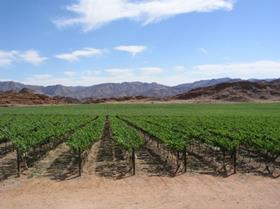
South Africa’s table grape export crop forecast has been reduced for the second time this season and is expected to be lower than last year’s crop, although it will still come in significantly higher than the crop of 50.5m cartons exported in in 2013/14.
The table grape association SATI says there has been a reduction in the crop in the Orange River region and this trend is expected to continue in the mid- to late-season regions, including the Olifants River, Berg River and the Hex River Valley.
“Warm and dry conditions during the growing season in these regions have also resulted in smaller berry size at harvest,” said SATI in a statement. “In addition, water restrictions in the Olifants River region constrained berry size and bunch weights.”
Total exports are now expected to reach no more than 58.7m cartons, down from the pre-season forecast of between 61m and 63m cartons.
The Orange River, which normally leads South Africa’s early season grape charge, was expected to top the 20m carton mark this year for the first time. With the harvest just about over in the region, Orange River producers are expected to reach around 18.5m cartons – still well up on last year’s harvest of 17.6m cartons.
SATI noted that the crops in the Olifants River have been reduced by 10 per cent, in the Berg River by 8.7 per cent and in the Hex River region by 7 per cent.
South Africa has been in the grip of a devastating drought since last year. Maize and wheat crops in the central and northern regions of the country have been decimated while livestock producers have suffered huge losses. Drinking water in many towns in the rural regions is at critically low levels.
In the Cape fruit regions some areas had well below the normal rainfall during the winter and citrus, stonefruit, apple, pear and grape growers are now feeling the effect.
Annalie Hauman of Stems said that it was inevitable that the stonefruit crop would be reduced while growers tried to utilise what water they have as effectively as possible. “We see this in the size specification and some of our very heat sensitive plums are showing defects,' she explained.
Citrus growers in the Olifants River are deeply concerned about prospects for their coming season. “What is deeply concerning is that the river has stopped flowing some 10km upstream from Citrusdal,” outlined local grower Piet Smit. This affects the biggest part of the Cape citrus industry and is likely to affect the supply programme to the US later in the year.
In the northern regions around Letsitele and Hoedspruit there is also a critical shortage of water. Growers are reported to be facing the agonising choice of which of their orchards they can keep alive and which ones they should abandon. In the later cases fruit which has formed on the tree is cut off to further reduce stress, and the plants are cut back severely in the hope that good rain will be around the corner so the trees can sprout again.



